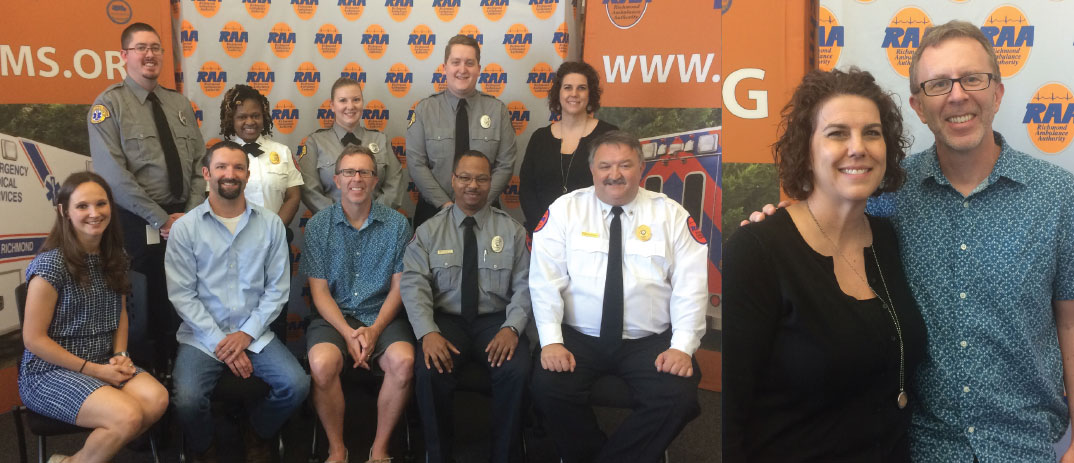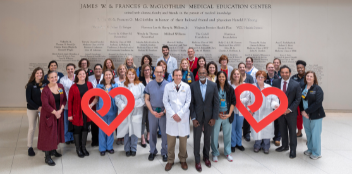Chain of Survival Saves Runner

Jeff Stover was steps away from the finish line of the Monument Avenue 10K this April when he collapsed.
Stover, 48, has little memory of the race— a family tradition that he undertakes each year with his eldest son. “I remember starting, and then I remember at the very end, I could see the finish line. I remember thinking to myself, `Should I pick up the pace a little bit—you know, finish strong?’ And then I remember saying to myself, `No, I’m good.’”
“Every person in that chain is extremely important,” said ARCTIC Medical Director Mary Ann Peberdy, M.D. “The early care that those patients get really sets the tone for how well they’re going to do afterwards.”
His 15-year-old son, Harrison, had already completed the race and was waiting for his dad at Monroe Park with friends when Stover went into cardiac arrest and collapsed about 10 yards from the finish line. Fortunately, he had some helpful—and well-trained—strangers who jumped in to help. Running behind him was an emergency physician from University of Virginia, who immediately began administering CPR. A paramedic bystander, who was waiting for his wife to complete the 10K, also rushed over to help. Nearby in a tent at the finish line were Richmond Ambulance Authority paramedics, who used a defibrillator to quickly regain a heartbeat and then brought him to VCU for the ARCTIC program.
Stover underwent ARCTIC therapy at VCU, then required surgery to fix the problem that had led to his cardiac arrest.
“My issue was a bicuspid aortic valve. It’s hereditary, but I didn’t know I had it,” he said. Most people have three flaps on this valve, but Stover had only two. “So, it already isn’t working as efficiently as it should. And then it tends to calcify more.”
Looking back, he realized that a doctor had detected a murmur during a high school physical—but no testing was ever done, which would have revealed his condition. He also remembers that he got more out of breath training for the 10K this year than in the past.
As to his care, Stover benefited from the perfect experience of what the American Heart Association calls the out-of-hospital Chain of Survival for Cardiac Arrest. The five links in this chain are:
- Recognition of cardiac arrest and activation of the emergency response system
- Early cardiopulmonary resuscitation (CPR) with an emphasis on chest compressions
- Rapid defibrillation
- Basic and advanced emergency medical services
- Advanced life support and post-cardiac arrest care
“Every person in that chain is extremely important,” said ARCTIC Medical Director Mary Ann Peberdy, M.D. “The early care that those patients get really sets the tone for how well they’re going to do afterwards.”
“Every person that I come into contact with through the ARCTIC program has either been saved by CPR or potentially saved by knowledge of CPR,” said Michelle Gossip.
ARCTIC Program Nursing Coordinator Michelle Gossip, who assisted in coordinating Stover’s care in the hospital, said VCU trained about 2,000 community members in Hands Only CPR last year. She is passionate about this outreach. “Every person that I come into contact with through the ARCTIC program has either been saved by CPR or potentially saved by knowledge of CPR,” she said.
Stover, whose path ran smoothly from immediate CPR all the way through to the care he received at VCU (“I can’t speak highly enough of the folks at VCU”) knows he is fortunate.
“All the stars aligned—almost as perfectly as they could have.”
Note: According to cardiologist Joe Ornato, M.D., exercise is very beneficial to the heart. A very small percentage of cardiac arrests occur during exercise, usually as the result of a previously unknown blockage or other form of heart disease. Most cardiac arrests—88 percent, according to the AHA—occur at home, but your chances of survival are much better if your arrest is witnessed, in a public place, and bystanders call 911 immediately, perform CPR, and apply an AED before EMS arrives.
LEFT: ON JUNE 2, CARDIAC ARREST SURVIVOR JEFF STOVER REUNITED WITH VCU ARCTIC PROGRAM COORDINATOR MICHELLE GOSSIP AND FIRST RESPONDERS DR. DEBORAH VINTON, FLIGHT PARAMEDIC HUGH CLINE, AND PARAMEDICS FROM THE RICHMOND AMBULANCE AUTHORITY WHO HELPED SAVE HIS LIFE. / RIGHT: JEFF STOVER WITH MICHELLE GOSSIP WHO HELPED COORDINATE HIS CARE AT VCU.
Back to Summer-2017

